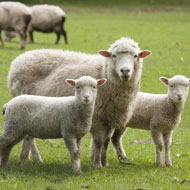
Working Group identifies challenges faced by police forces
A new report highlighting the scale of dog attacks on livestock has been published by the National Police Chief’s Council (NPCC).
Dogs owners are not currently required to report to the police if their dog attacks livestock, and dog attacks are not treated as a ‘recordable crime’. As such, there is little data on the scale of the problem facing livestock owners and farmers.
Over the last 12 months, five police forces from across the UK have been taking part in a project looking at the true extent of livestock worrying. The forces, North Yorkshire, Devon and Cornwall, Sussex, North Wales and Hertfordshire, analysed data on their systems from September 2013 to 2017.
The investigation found that there were 1705 recorded incidents of livestock worrying and attacks in the five force areas. A total of 1928 animals were killed, and 1614 injured, at an estimated cost of £250,000.
It also found that 11 per cent of the incidents involved repeat offenders, e.g. owners whose dog had worried or caused damage to livestock before. In the majority of incidents, the dog owner was not present at the time of the attacks.
Following a review of the findings, the NPCC’s Wildlife and Rural Crime Working Group has identified a number of challenges faced by police forces when dealing with sheep worrying.
They note that many animals, such as llamas, ostriches, alpacas and emus, are susceptible to dog attacks but are not defined as livestock, meaning they are not covered by the law. They also point out that dog attacks are only unlawful in certain places. For example, if a dog attack occurs on a public lane, it is not considered unlawful.
“This project provides hard data showing livestock worrying is a very significant issue for farmers that impacts on their livelihoods,” said chief constable David Jones, NPCC’s lead for wildlife and rural crime.
“We need dog-owners to take responsibility for their animals – not just by putting their dogs on a lead when out walking, but by preventing them from escaping from home and causing damage to livestock. We need livestock owners to report incidents so that we can gather intelligence and launch investigations.
He continued: "Above all, we need the powers to tackle this problem effectively and an overhaul of the outdated and sometimes ineffective rules surrounding livestock worrying”.



 The latest
The latest